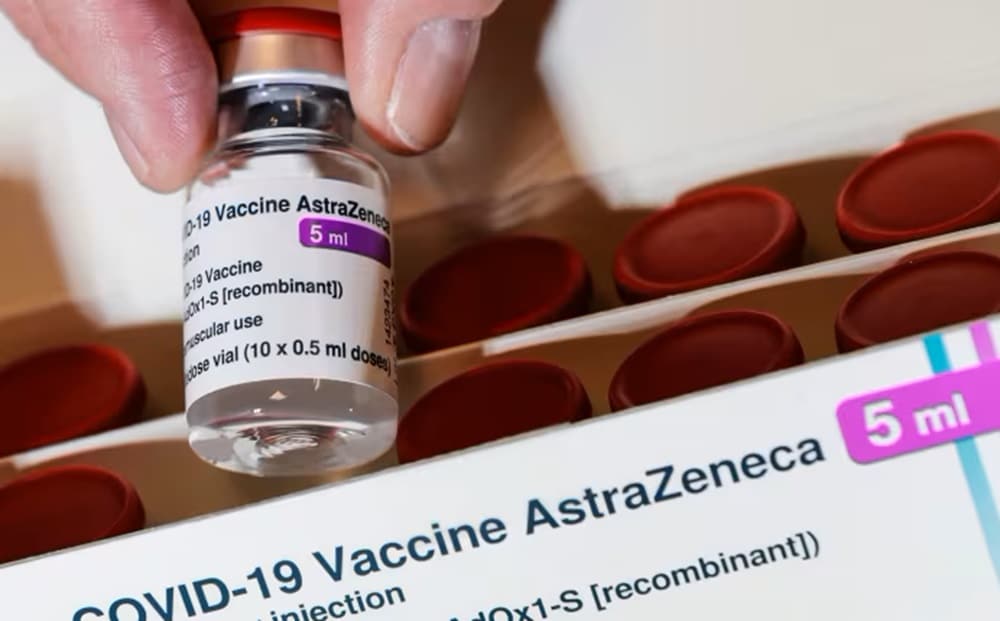Health
AstraZeneca Removes Covid-19 Vaccine from the UK Market

AstraZeneca is pulling its Covid-19 vaccine from the UK market less than four years after its debut, citing a “surplus” of vaccines targeting newer strains and declining demand.
On Wednesday, AstraZeneca stated that while it was “proud of the role Vaxzevria played in ending the global pandemic,” the company would no longer manufacture or supply the medicine due to a “surplus of available updated vaccines.”
The decision marks the end of the road for the vaccine, which was developed in partnership with experts at Oxford University within months of the pandemic’s breakout. It was authorized in the UK in late 2020, and over 3 billion doses have been distributed since its debut.
Unlike rivals Pfizer, BioNTech, and Moderna, AstraZeneca initially used a non-profit approach for its vaccine, selling it “at cost” as part of an agreement with Oxford. The medication was critical in ending the epidemic. However, its deployment was marred by rare cases of blood clotting and disagreements with the European Union over access to medicine.
“According to independent estimates, over 6.5 million lives were saved in the first year of use alone,” AstraZeneca stated, adding that additional COVID-19 vaccines have since been produced, reducing sales of its own medicine.
First Vaccine Approved in the UK
The announcement comes after the pharmaceutical company sought in March that the European Union withdraw its marketing authorization for Vaxzevria, which was granted on Tuesday.
AstraZeneca’s vaccine has been supplanted by mRNA-based vaccines produced by BioNTech/Pfizer and Moderna, which are now the most widely used worldwide.
According to the company’s full-year figures, AstraZeneca’s jab generated only $12 million in sales in 2023, compared to nearly $4 billion in 2021. In late 2021, AstraZeneca signed its first for-profit arrangements, claiming the pandemic had entered an “endemic phase.”
The vaccine was approved in the United Kingdom in December 2020 and the European Union in January 2021, but it was never approved in the United States, where authorities criticized the company’s presentation of data on vaccination efficacy.
Overall, the vaccination was safe and effective, but confidence in it dipped in 2021 following a string of rare blood-clotting occurrences, prompting European authorities to restrict its use among younger people.
Jamie Scott is suing the firm, alleging that taking the vaccine caused him to develop a major blood clot. If held accountable, the UK government’s vaccine damage payment plan would compensate for any damages. The business stated that the removal was unrelated to the uncommon blood clotting incidences.
AstraZeneca stated: “We will now work with regulators and our partners to align on a clear path forward to conclude this chapter and significant contribution to the Covid-19 pandemic.”
About AstraZeneca
AstraZeneca is a global pharmaceutical corporation based in Cambridge, England. It develops and manufactures various medications to treat various medical ailments. During the COVID-19 epidemic, the business earned headlines for its collaborative efforts to create a vaccine with Oxford University.
Vaxzevria COVID-19 vaccine was one of the first vaccines approved for emergency use worldwide. Despite initial issues with efficacy data and worries about potential adverse effects, the vaccination proved successful in preventing severe illness and death from COVID-19. It was essential in vaccination campaigns throughout Europe and the rest of the world.
Their line of pharmaceuticals extends beyond the COVID-19 vaccine to include cancer, cardiology, respiratory, and metabolic illnesses. The corporation invests substantially in R&D, hoping to bring breakthrough therapies to market. It operates in over 100 countries and employs tens of thousands worldwide.
AstraZeneca has experienced numerous controversies and legal challenges, including litigation involving drug pricing and marketing activities. However, it remains a key player in the pharmaceutical sector, strongly emphasizing scientific research and global health programs. The company’s response to the COVID-19 epidemic has strengthened its position as a major contributor to global public health efforts.
Source: The Financial Times








































